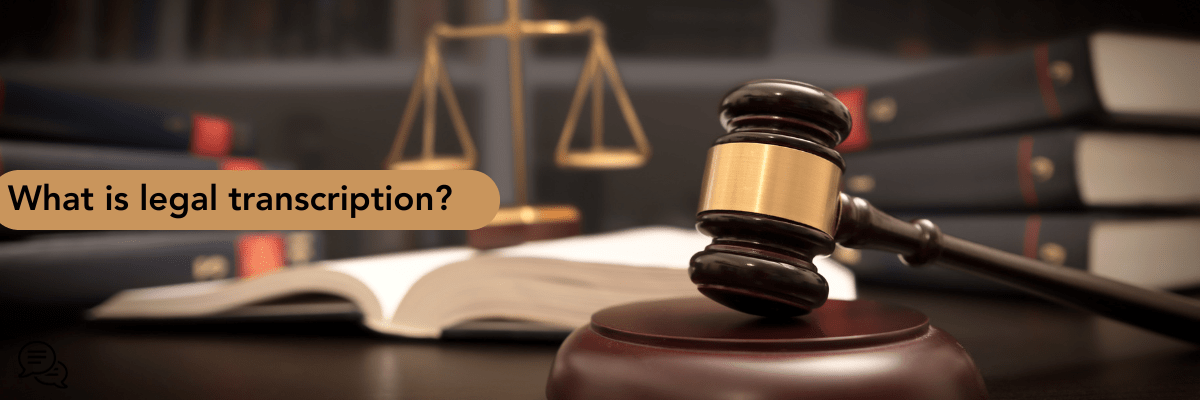
What is Legal Transcription and How to Become a Legal Transcriptionist
98% accurate, real-time transcription in just a few clicks. 58 languages and multiple platforms supported.
"Can any transcriptionist handle legal transcription?"
Not every transcriptionist can handle legal transcription. Legal transcription is a whole different avenue on its own. To succeed in this field, you must counterbalance accuracy and efficiency and deeply understand the legal vocabulary. Unfortunately, only a few transcriptionists can meet this requirement. As a result, the demand for a legal transcriptionist is ever-present. So, how do you get started in this field? Join me as we try to understand legal transcription, its benefits, and how to become a transcriptionist.
What is legal transcription
Legal transcription refers to converting the audio and video of any legal proceeding, such as depositions, hearings, legal interviews, and briefs (live or recorded), into easy-to-read text. A skilled legal transcriptionist is responsible for crafting accurate, error-free, and verbatim transcripts to deliver to the requesting party.
A legal transcript can serve several purposes depending on the end user. For example:
Lawyers and attorneys: Use legal transcripts as important reference material in building arguments for their cases.
Judges: Use legal transcripts to review court proceedings and make informed decisions.
Jurors: Court reporters read these transcripts to them to help jog their memories on crucial details in a trial.
Legal researchers and students: Use these transcripts as study cases and sources of legal precedents.
Legal historians: Use these transcripts to identify landmark cases and changes in the legal field.
More importantly, these transcripts provide a way to improve the integrity and transparency of court proceedings.
Differences between transcription and dictation
It's common to see people interchangeably using the terms' transcription' and 'dictation' when discussing legal transcriptions. However, there is a discerning difference between the two. Dictation is the process of narrating speech to a recording device or another person (most often a secretary) who writes down everything you say.
This means you can end up with a conversation recording that you can playback or a copy of the conversation notes. Dictation is valuable for lawyers who want to practice their arguments before heading to court. You can also use it when taking personal notes or brainstorming ideas.
Transcription, conversely, is converting recorded or live speech to text by either typing it or using voice recognition software. It is instrumental when you need to share information or as a reference material to use in the future.
So, how do you choose between the two? Well, it all depends on how big an impact either can have on your schedule.
For example, legal transcription generally takes longer than dictation, which is almost instantaneous if you use a recording device. Therefore, dictation may be the best option if time is a concern. Legal transcriptions take longer depending on the audio's clarity, the transcriber's typing and editing speed, and the ability to navigate the complexity of the subject matter. The skills and experience of the legal transcriber also play an essential role in how long the process takes.
Transcription may be the best option if accuracy and precision are your biggest concern. Since every word, sound, and nuance matters, legal transcripts provide verbatim records. Dictation largely depends on the skills of the person doing the recording or the quality of the dictation tool.
While there are distinct differences in how you can use transcription and dictation, they benefit legal practitioners and complement each other to provide a streamlined working experience. It, therefore, helps to use them both and maximize your efficiency and accuracy.
Transcriptionists vs. Court reporters
These two professions may appear similar since they involve doing the same thing: transcribing speech to text. However, there is a massive difference in their duties, execution style, location of execution, and educational requirements.
Legal transcriptionist
A legal transcriptionist only works on recordings of previously recorded legal information, converting them into verbatim text documents. They can type it manually or use transcription software to speed up the process. Some of the commonly transcribed content includes:
911 calls.
Witness interviews.
Legal documents.
Recorded depositions.
Recorded hearings.
Legal transcriptionists do not have to work in a courtroom. They can freelance and work from anywhere or work in-house in a law firm, transcription company, or legal institute. Their tasks are simple, and they have enough time to review a recorded audio file several times to ensure the accuracy of their report. To become a legal transcriber, you do not need to have any kind of credential. However, some States require a one-year certification for you to gain recognition.
Court reporter
A court reporter transcribes every conversation in a courtroom when in session. They use a stenographer to type every word by the judge, jurors, bailiff, plaintiff, defendant, attorneys, and witnesses. As a result, speed and efficiency is an important quality they must develop.
Court reporters can also be assigned to be notary publics in particular states, where their duties involve administering oaths to witnesses and certifying the transcripts of the proceedings. To be a court reporter, you must study in an institution approved by the National Court Reporters Association for 2-4 years and attain a degree. You must also get state-mandated licenses by passing specific examinations.
Notta can convert your spoken interviews and conversations into text with 98.86% accuracy in minutes. Focus on conversations, not manual note-taking.
Top benefits of legal transcription
You can get several benefits from pursuing legal transcription as a career. These include:
In-demand skills: Although plenty of tech tools can provide speech-to-text services, it will take a long time before they can fully replace the need for a trained legal transcriptionist. These tools do not understand the intricacies of the legal terminology as well as a professional. Therefore, the demand for professionals with high legal knowledge will always be present.
Flexibility: Legal transcriptionists enjoy a flexible work experience. They are primarily freelancers who can choose the tasks to do, time, and location according to their preferences.
Networking: Working in the legal industry opens up many opportunities. You can create long-term relationships with law firms and institutions that may help you in the future.
Competitive pay: Legal transcriptionists have one of the most competitive pay rates in the market. Your income is related to your experience and level of education. The higher it is, the more you can make.
How to become a legal transcriptionist
As we identified earlier, you do not need a formal degree to become a legal transcriptionist. However, to receive recognition as one, there are several things you need to do:
1. Get a transcription foundation
You can gain this by completing a certification program from a community college, vocational institution, or technical school. These programs provide the foundation for legal transcription, such as a good understanding of legal terminologies and how to proofread, edit, and format your transcript.
2. Improve your skills
Take time to hone your listening and typing skills. Practice how to type faster without looking at your keyboard. Work towards typing between 80-100 words per minute. (On average, 50-60 words per minute is the American Association of Electronic Reporters and Transcribers (AAERT) standard.
3. Get a certificate
Although certification is not necessary, it sets you apart from other candidates in the field. Therefore, the more certifications you have, the more professional you seem. This is especially true if the credentials are from well-recognized institutions. You can take an assessment test by the AAERT to be a certified electronic legal transcriber and renew it every three years.
4. Get on-field experience
You have heard the saying, 'Experience is the best teacher,' right? Therefore, identify a transcription company that can offer you an entry-level transcription role. You may be working under an attorney or paralegal. Take time to master everything about this role, and do not hesitate to ask questions when you are stuck.
The time it takes to become a transcriptionist depends entirely on the path you take and the efforts you put in. Ideally, getting all the required skills to start working as a legal transcriptionist should take a few months to a year. However, if you opt to start with a degree, it will take you five years to get started.
What to look for in a legal transcription company
While working as a legal transcriptionist, you can be an independent freelancer or work for an agency. If an agency is your preferred direction, then consider the following things before choosing one:
1. Reputation
Reputation is an essential cornerstone for every industry. Look out for what clients and transcriptionists say about a particular agency. You can get this information in transcription forums, company review websites, or word of mouth. Working with a reputable agency ensures you are well compensated and opens doors to other opportunities.
2. Training and support
Does the agency provide enough training and support to their transcriptionists? Look out for organizations that can support your growth by providing you with the necessary guidelines, resources, and tools that you can use to succeed. Inquire about their quality control processes and methods they use to provide constructive feedback.
3. Payment structure and frequency
Before enrolling in any agency, clarify how much the agency is willing to pay you for your services and how they do it. Do they pay per audio minute or per word? And will they do it weekly, bi-monthly, or monthly? Remember to factor in your skill level when making this decision. It's also beneficial to ask if they offer salary increments over time when you meet specific goals.
4. Work volume
You want to get an agency that can provide you with a consistent flow of assignments. A good telltale can be the type of client that the agency works with. If they have reputable clients and good reviews from them, then it means that clients find them reliable and can equate to work consistency. Still, finding this out straight from the horse's mouth is best to avoid disappointments later.
Notta’s legal transcription service
The advent of AI transcription services is rapidly changing the legal transcription scene. AI provides solutions to problems plaguing this industry for years, such as:
Slow turnaround times for legal transcription: What used to take days to complete can now take minutes.
Scalability: Law firms can use AI to scale their solutions and meet all their pending workload without hiring a new workforce.
Improved workflows: All transcriptionists can work in one platform, making collaborating and following up on action items easy.
Compliance and record keeping: You can find all your legal transcripts in one place, making it easier to access them when needed and share them with your team.
Notta is making airwaves for being your go-to legal transcription service. It has a high accuracy rate (98.86%), can handle various audio and video file formats, It's very fast, provides a collaborative workspace, and protects your data with a top-grade encryption service.
To use Notta to transcribe your recordings:
Step 1: Head to the Notta web platform and create an account if you don't have one.
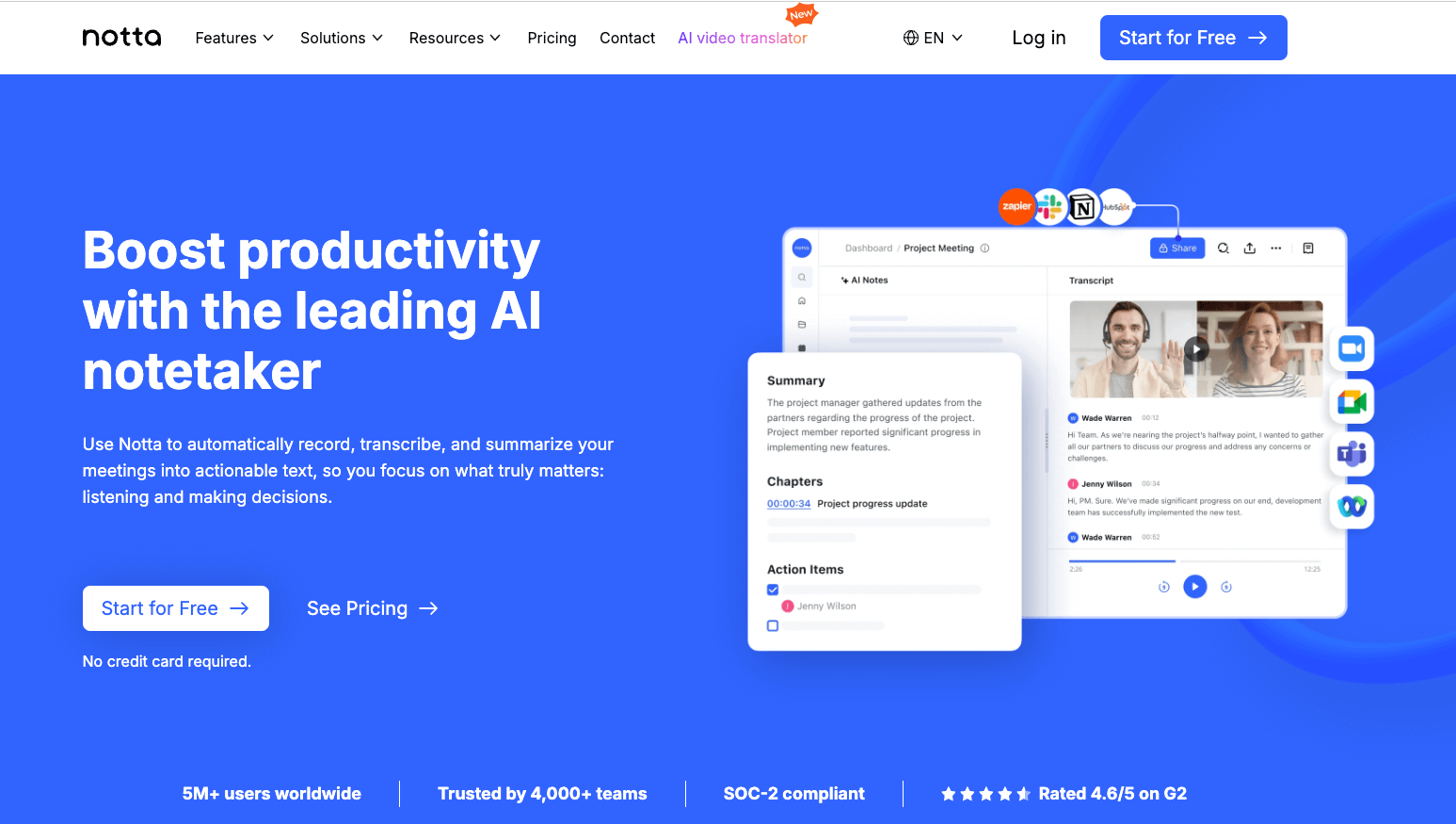
Step 2: Once you log in to the dashboard, click ‘Import files’ on the right side of your screen.
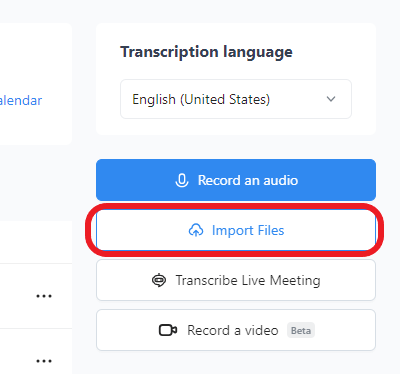
Step 3: Set your transcription language in the pop-up box before importing the legal audio file you wish to transcribe. The transcription process will start immediately.
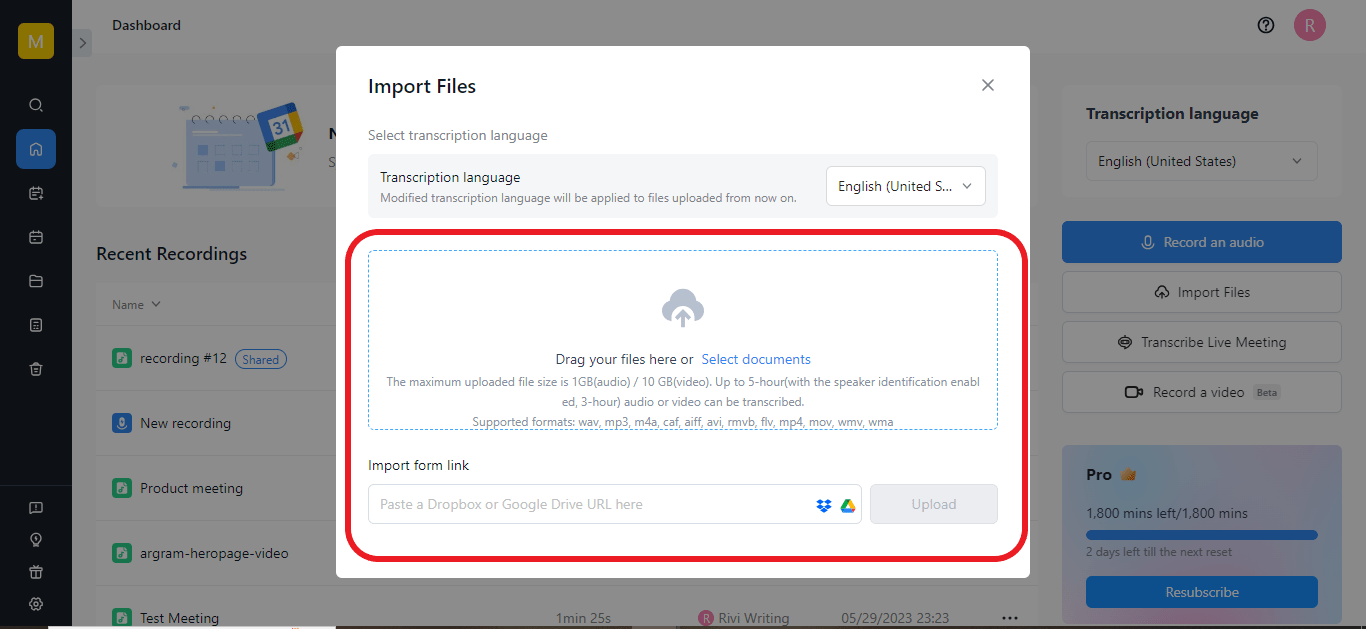
Step 4: Once the transcription is complete, navigate to the dashboard and find the legal transcript under ‘Recent Recordings.’

Step 5: Proofread and edit your legal transcript using the built-in editor, then click share to allow your teammates to access the file.
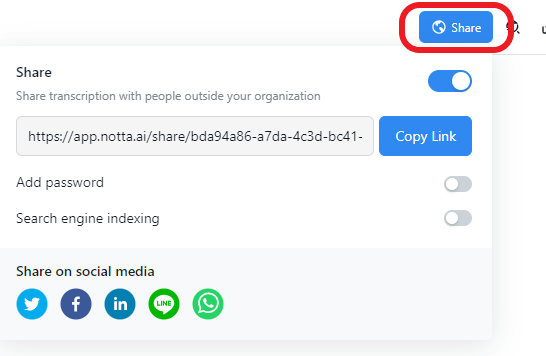
Step 6: Click the export button and your most preferred format.
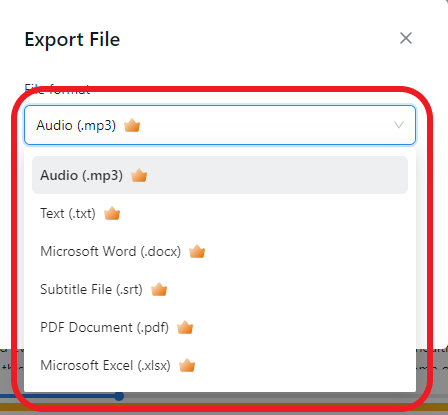
Notta is an excellent tool for legal transcriptionists, law firms, and institutions looking to streamline their transcription workflows.
Use Notta's AI transcription tool to quickly and easily transcribe audio and videos. We guarantee accuracy and ease of use.
Conclusion
Legal transcribing is not a new concept. It has been around since the beginning of the legal profession. In the past, it was a cumbersome task that took days to complete. Today, you can use technology to improve your transcription speed and accuracy.
But do these tools negate the role transcriptionists play? Not at all! In fact, they make you a much better transcriptionist since you can focus on the finer details, such as formatting, saving enough time to handle several tasks.
So, apart from getting the skills and experience necessary to become a legal transcriptionist, use a tool like Notta to improve efficiency and help you stand out in the marketplace.